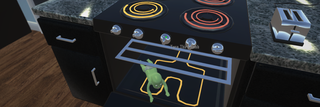
THE HIGHS
Tom Senior: AGDQ
Awesome Games Done Quick is my high of the week. It's a charity drive for the Prevent Cancer Foundation built around a live event in which some of the world's best speedrunners break games in beautiful ways to complete them in the shortest time. My favourites disrupt my familiarity with games I've played to death. Speedrunners use engine quirks and geometry exploits to phase through walls, jump over entire levels and perform other acts I'd never thought possible.
I enjoy the speedrunner's determination to shave a few seconds off a previous time, and the diligence needed to discover new tricks. For most of the playthroughs in Awesome Games Done Quick the performers narrate their runs, explaining the tactics they're using to subvert the developers' intentions. You learn that holding a box in the face of an NPC can skip cutscenes, or that hopping backwards in a certain way can allow you to go fast enough to leap past a village. These game-breaking techniques puncture the illusion the game is trying to sell. It’s the curtain moment in the Wizard of Oz—the realisation that games are just numbers and collision meshes.
However, sometimes there is no way to cheat. The only way to go fast is to be insanely fast, as Staiain demonstrates here in StepMania. Wow.
Tyler Wilde: Virtual reality reality
In 2013, a kid no one had heard of made a Kickstarter campaign for a VR headset, and this week the first consumer version of that headset went on sale. VR is happening. I want to celebrate that, because before Oculus, home VR was dead as far as I knew. It was a joke, but here we are, a few years later, and Valve, HTC, Facebook, and Sony are all working on it. There are lots of reasons to have reservations, but putting aside sticker shock and fears that Facebook’s going to mine our skulls for data, I’m glad this story happened. I wonder if VR will be the mainstream revolution some have predicted—I think Palmer Luckey thinks it will be—or if it’ll settle into a niche gaming space, but I’m fine with either. I’m just happy it’s here.

Tim Clark: Monkey islands
I’m having a great time playing Don’t Starve: Shipwrecked at work (when no one’s watching). I pretty much skipped over the Reign of Giants DLC because, having already presided over a 300+ day save, I’d already sucked much of the marrow from the base game, and needed more than just big new monsters to lure me back. Shipwrecked’s tropical setting has done that, and rekindled my love for Klei’s brutally brilliant permadeather in the process. It’s exciting to see there’s already a rich roadmap of stuff still to come.
The expansion, which was partly outsourced to Capybara Games, does a great job of encouraging you to play differently. Because the map is broken into islands, you’re effectively forced to explore further afield rather than turtle up in your ever-expanding base. The fact you can make all manner of seafaring vessels to chart the inevitably lethal oceans very much makes this Don’t Starve’s own Black Flag. And then there are the monkeys. These light-fingered grinning idiots will steal your stuff if you leave it on the ground for a second. Which is obviously massively irritating, but also means it’s incredibly satisfying to corner one, brain it, and see all your gear pop from its corpse. Don’t tell PETA, but I know how I’m spending my weekend.
PC Gamer Newsletter
Sign up to get the best content of the week, and great gaming deals, as picked by the editors.
Samuel Roberts: Creed 2017
It’s a bit too fashionable to hate on Assassin’s Creed since it’s such an easy target—it’s out yearly, it’s a mega seller even when the year’s entry isn’t that good (ACIII sold 10 million copies) and its platforming and combat systems are too simplified for me. There’s a lot to love about the series in terms of art direction, scale and audio design—but the game within it is just too simple, and too broadly targeted to offer any real player expression. I don’t think the series has had any positive long-term influences on the medium, honestly.
With the rumour this week that the series is going on hiatus this year, and taking more of a Witcher-type direction with a ‘freeform’ combat system. Better yet, it’ll be developed by the Black Flag team, which is the best one (mainly because of the naval combat, a system added to the series that didn’t just play itself with one button press). This sounds like sensible thinking to me, if true. A year off and more detailed ways to interact with those amazing worlds is exactly what Ubisoft’s series needs.

Chris Livingston: The parent trap
This week I watched as James Davenport ate a handful of batteries before climbing into an oven and tried to cook himself. This was during a session of Who's Your Daddy, a two-player online game in Early Access where one person is a reckless baby and the other is a protective parent. Baby's goal is to die in any number of ways: sticking a fork into an electrical outlet, eating glass, drinking bleach, climbing inside major appliances, and so on, while the dad scurries around desperately trying to stop him.
I guess it's a bit weird to say I enjoyed watching a baby die, or enjoyed—as a baby—delivering myself to a horrible end. But it was fun, in a sort of comically repulsive way, and I'd say it successfully demonstrates the types of fears new parents must have and the general feeling that if they turn their heads for even a second their infant will meet a terrible demise. Lessons learned: keep your batteries on a high shelf, don't let your baby crawl around with a hammer, and lock up your sex toys. You can see some animated gifs and read our discussion here.
Phil Savage: Pony Island
This week, a game called Pony Island was released on Steam. It costs £4/$5. You should buy it.
I don't really want to say more. As a critic, that feels like a cop out, but your experience will be enriched by knowing as little as possible. I bought it without even looking at the Steam page screenshots, and had a more exciting ride—haha, ponies—because of it.
I'll say this: it's not really about ponies, or even islands. It's a puzzle adventure, although that's a deliberately reductive label. It's also the first great game of the year. One moment in particular was one of the most unexpected and temporarily alarming things that has happen to me in a game—beautifully and cleverly blurring the line between fiction and reality in a way that drew me fully into the game's world. It's definitely, unquestionably worth a look.
Hey folks, beloved mascot Coconut Monkey here representing the collective PC Gamer editorial team, who worked together to write this article! PC Gamer is the global authority on PC games—starting in 1993 with the magazine, and then in 2010 with this website you're currently reading. We have writers across the US, UK and Australia, who you can read about here.
Most Popular


